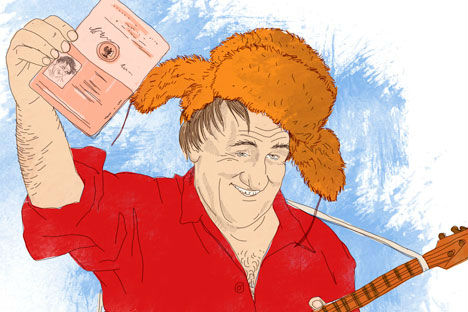Wealth flees to Russia, but stark moral choices remain

Drawing by Natalia Mikhaylenko
The not-so-sudden
decision by President Vladimir Putin to grant Russian citizenship to legendary
French movie star Gerard Depardieu should fill Russians' hearts with pride.
The actor who has chalked up scores of magnificent performances, including
Cyrano de Bergerac, Danton and Napoleon, decided to surrender his French
nationality after the government of President Francois Hollande introduced a 75
percent income tax on those earning over 1 million Euros per annum.
He has promised to learn Russian and settle a few dozen kilometers from Moscow,
in the countryside.
But Russians are, perhaps surprisingly, split over Depardieu’s decision. While
the majority will no doubt be glad to have a world famous actor as their
compatriot, the minority have questions about Depardieu's integrity.
Personally I do not see anything wrong with someone not wanting to pay 75
percent tax on one's earnings. It is an exorbitant and patently unfair rate.
The question lies, rather, on a purely moral plain.
Depardieu is notorious for being willing to pay obsequies to the likes of Uzbek
dictator Islam Karimov (or, rather, his daughter Gulnara), Azeri strongman
Ilham Aliev and Chechnya's Ramzan Kadyrov. A YouTube video shows him shouting
in broken Russian “Glory to Ramzan!” last autumn at a public celebration of the
Chechen leader's birthday in the Chechen capital Grozny.
It is assumed that Depardieu takes home a handsome fee for these appearances.
He is by no means alone in this; however others, such as Hilary Swank, have
later expressed regret and donated their honorariums to charities.
Not so with Depardieu who seems not only to delight in pocketing the money (if,
indeed, he does), but also in offending public opinion. His thank you letter to
Vladimir Putin praises Russia for its “great democracy.”
This has made many
Russian intellectuals complain about the French actor's lack of moral scruples.
The debate is characteristic for contemporary Russia, where in the past year
issues of public personalities’ moral standing and reputation became
particularly acute.
Only recently satirical writer Mikhail Zhvanetsky and economist and former
minister Yevgeny Yasin (both members of the metropolitan liberal elite which
generally opposes the Kremlin) came under fire from sections of the public for
accepting awards from Putin.
This is a problem that will not just go away. The Kremlin made a clear choice
in favor of the polarisation of public opinion, particularly in portraying
anyone who opposes Putin's policies as “anti-Russian.”
Given these circumstances, it will be increasingly difficult for many to
maintain the good-hearted “clubby” atmosphere between metropolitan
intellectuals without referring to one's public stance. Just six or seven
months ago it was still possible to ignore these ideological differences.
But the string of Kremlin-sponsored laws limiting civil liberties, and the
recent “anti-Magnitsky law,” banning the US citizens from adopting Russian
children, have faced a lot of people with stark moral and political choices.
These choices now have consequences: including damage to personal relations on both sides of the political divide. Gerard Depardieu, if he decides to reside in Russia, may well find out soon what this means.
First published in RIA Novosti.
All rights reserved by Rossiyskaya Gazeta.
Subscribe
to our newsletter!
Get the week's best stories straight to your inbox